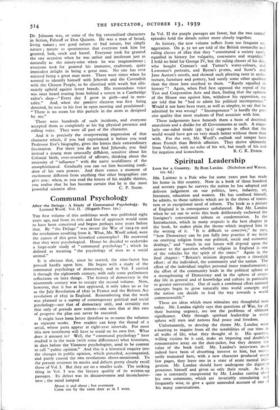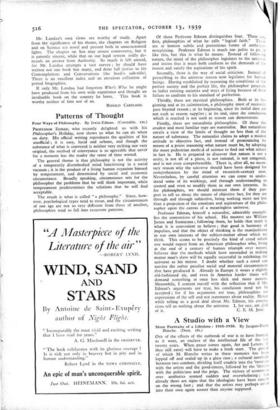Spiritual Leadership
Love for a Country. By Rom Landau. (Nicholson and Watson. I2S. 6d.) Mx. LANDAU is a Pole who for some years past has made his home in this country. Now in a book of three hundred and seventy pages he surveys the nation he has adopted and delivers judgement on our politics, laws, industry, art, literature, education and women. He has confined himself, he admits, to those subjects which are in the throes of transi- tion or in exceptional need of reform. The book as a picture of England is in consequence unbalanced. But Mr. Landau when he set out to write this book deliberately eschewed the foreigner's conventional tribute or. condemnation. In the Introduction, which in many respects is the best chapter in the book, he makes plain the theme which inspired him in the writing of it. " It is difficult to conceive," he says, " how Democracy can be put fully into practice if we insist on omitting religion from our political, social and economic dealings," and "much in our future will depend upon the answer to the question whether religion in England is one of the vehicles for the spirit of the times." Again in the final chapter : " Britain's mission depends upon a threefold effort: of the individual, the community and the nation. The effort of the individual implies personal inner transformation ; the effort of the community leads in the political sphere to a strengthening of Democracy and in the sphere of every- day life in general and of knowledge and culture in particular to greater universality. Out of such a combined effort national concepts begin to grow naturally into world concepts and the nation can decide to lead the way towards a world commonwealth."
These are ideas which must stimulate any thoughtful man today. Mr. Landau rightly says that questions of War, for all their burning urgency, are not the problems of ultimate significance. Only through spiritual leadership in every sphere will men and nations find peace and freedom.
Unfortunately, to develop the theme Mr. Landau went a-hunting to inquire from all the notabilities of our time in all walks of life, what they thought of it. His quarries, willing victims be it said, make an imposing and doubtless remunerative array on the dust-jacket, but they destroy the value of the book itself. Mr. Landau's interviews must indeed have been of absorbing interest to him, but neces- sarily truncated here, with a new character produced every few pages, they leave one in a state of acute mental indi- gestion. Mr. Landau should have undergone the digestive processes himself and given us only their result. As it is, one is constantly exasperated by Mr. Landau cutting short his own comments, which are invariably stimulating and frequently wise, to give a quite unneeded account of one of his many conversations.
Mr. Landau's own views are worthy of study. Apart from the significance of his theme, the chapters on Religion and on Science are novel and present both in unaccustomed lights. The chapter on Sex may arouse controversy, but it is patently sincere, while that on our legal system really de- mands an answer from Authority. So much is left unsaid, for Mr. Landau attempts a vast survey ; he should have written not one book but many, and done full justice to his Contemplations and Conversations (the book's sub-title). There is an excellent index and an atrocious collection of potted biographies.
If only Mr. Landau had forgotten Who's Who he might have produced from his own wide experience and thought an invaluable book on the country he loves. This book is worthy neither of him nor of us.
RONALD CARTLAND.











































 Previous page
Previous page